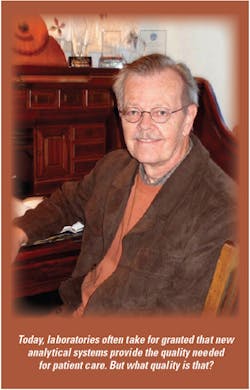James Westgard
Professional
Emeritus Professor of pathology and laboratory medicine,
University of Wisconsin (UW)
Medical School-Madison;
President of Westgard QC,
a family business that provides
education and training in
laboratory quality management,
www.westgard.com;
almost 40 years of experience
in the clinical laboratories
at the UW hospitals and clinics.
Education
PhD and MS degrees, Analytical Chemistry, UW-Madison;
BA degree, Concordia College, Moorhead, MN.
Personal
Collector of 16th- to 18th-century Scandinavian maps;
and 20th-century American-Norwegian Rosemaling
(“rose painting”).
Furniture refinisher and repairman for wife's antique business.
Proud grandfather of four
In the lead-up to a recent meeting, COLA featured a
series of interviews with James Westgard, PhD, who recently published
the 3rd edition of Basic Method Validation. This book is part of
a series on analytical quality management that also includes Basic QC
Practices and Basic Planning for Quality. MLO was curious as
to how Dr. Westgard happened to develop these training materials.
Method validation. I trained as
an analytical chemist, graduated from UW in 1968, and began working in the
clinical laboratories at the UW Medical School. Clinical chemistry provided
real-world experience in applying concepts and principles of chemical
analysis. My first real-world problem was to evaluate the performance of a
new continuous-flow multichannel analyzer. At that time, there was no
standardized approach (this was before the days of NCCLS/CLSI). There were
some important gaps in knowledge — one being the application of statistics
to method validation (MV) data. Investigation of that problem by “data
simulation” led to one of my first papers (together with Marion Hunt) on the
“Use and Interpretation of Common Statistics in Method Comparison Studies,”
which recently was identified as a “Citation Classic” by the Journal of
Clinical Chemistry (March 2008, page 612). That knowledge was also the
basis for a series of educational papers on method evaluation first
published in 1978 in the Journal of the American Society for Medical
Technology and, later, as the monograph Method Evaluation. That
material has been updated over the years, and the 3rd edition of Basic
Method Validation, published by Westgard QC, is actually the fourth
publication (counting ASMT).
Quality control. Once a new
method has been evaluated, found acceptable, and is to be implemented for
routine operation, quality control (QC) is the next step in analytical
quality management (QM). In a sense, the purpose of QC is the same — to
assess if method performance is acceptable, but the process is more
difficult because only two or three samples are used for analysis. The
initial investigation of QC was patterned after the MV work, using data
simulation to determine the performance of different QC rules. I was lucky
to spend a sabbatical year in Uppsala, Sweden. There, I had access to and
the support of some of the world's leading scientists in computer simulation
of laboratory processes, so this was a much more advanced study for me. That
work eventually led to the multirule Shewhart Chart that, today, is commonly
known as “Westgard Rules.”
QC planning. Analytical methods
were improving dramatically, and newer systems were much more stable and
precise. It became obvious that the different QC procedures were appropriate
for different analytic systems and also for different tests on those
systems. So, the next step was to figure out how much QC was needed based on
the quality required for a test, and the precision and accuracy observed for
a method. A QC-planning-and-selection process was developed that wove
together the concepts from MV and performance information on QC rules to
identify the specific control rules and the number of control measurements
needed. This is the subject of Basic Planning for Quality as is a
more advanced book, Assuring the Right Quality Right.
Back to basics. There is an ongoing need for
education and training in analytical quality management. That is why
Westgard QC is dedicated to providing these materials. This is made possible
by my son, Sten, who has developed the Westgard.com
website, and who is the editor and producer of all of our educational
materials and online courses. Today, laboratories often take for granted
that new analytical systems provide the quality needed for patient care.
But what quality is that? If we do not know or have not defined that
quality, then we may be assuming rather than assuring, the quality of
laboratory tests.


